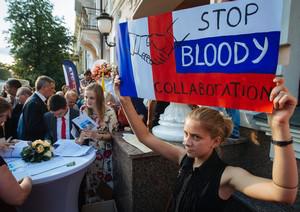Quick takes // By Ben FrankelRepeat performance: Russia’s French connection
After interfering in the 2016 U.S. presidential elections, the FSB and GRU, Russia’s two intelligence agencies, have turned their attention to Europe: The two rounds of France’s presidential election will be held in late April and early-May, and Germany’s parliamentary election will be held in September. In France, Russia’s preferred candidate is Marine Le Pen, the leader of the populist, far-right, National Front. But polls show that while Le Pen may just win the first round of the election (to be held 23 April), she will be easily defeated in the second round (7 May) by either the centrist Emmanuel Macron or the conservative Francois Fillon. Putin did not want Hillary Clinton in the White House, and he does not want Emmanuel Macron in the Élysée Palace. Yes, Le Pen is Putin’s preferred candidate, but since she cannot win, then Francois Fillon will do.

Demonstrators protesting France's Russia connection // Source: theconversation.com
After interfering in the 2016 U.S. presidential elections, the FSB and GRU, Russia’s two intelligence agencies, have turned their attention to Europe, where two important elections are to be held this year: The two rounds of France’s presidential election will be held in late April and early-May, and Germany’s parliamentary election will be held in September.
As was the case with Russia’s preference for Donald Trump, Russia supports French and German politicians and parties promising to pursue four goals which serve Russia’s interests: Weaken organizations such as NATO and the EU; weaken the liberal economic international order in favor more mercantilist and nationalist economic policies; accept Russia’s ambitions in central Europe and the Middle East; and end the criticism of the Putin government over political suppression and human rights violations.
In France, Russia’s preferred candidate is Marine Le Pen, the leader of the populist, far-right, National Front. A Russian bank controlled by a Putin supporter had lent the Le Pen campaign $10 million (which is legal in France, as long as the loan is reported), and last week Le Pen flew to Moscow for a photo-op in the Kremlin with Vladimir Putin.
But polls show that while Le Pen may just win the first round of the election (to be held 23 April), she will be easily defeated in the second round (7 May) by either the centrist Emmanuel Macron or the conservative Francois Fillon.
———————————————————————————————————
Read also:
Ben Frankel, “The Siberian candidate: Russia’s 2-pronged campaign to undermine the U.S. political system,” HSNW, 14 October 2016
Ben Frankel, “Will Putin pick the next U.S. president? He just might,” HSNW, 1 August 2016
———————————————————————————————————
This will be a repeat of the 2002 election. Le Pen’s father, Jean Marie Le Pen, came in second in the first round, edging Lionel Jospin, the Socialist Party’s candidate, by less than 1 percent (Le Pen received 16.86 percent of the vote to Jospin’s 16.18 percent).
In the second round, however, President Jacques Chirac crushed Le Pen by winning 82.21 percent to Le Pen’s 17.79 percent.
Marine Le Pen is projected to do better than her father, with the most recent polls showing her receiving 39 percent of the vote in the second round to Macron’s 61 Percent. Le Pen does a little better against Fillon, if he makes it to the second round: She will receive 41.5 percent to Fillon’s 58.5 percent.
